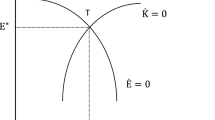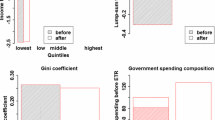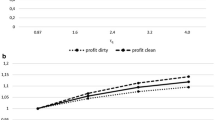Abstract
In this paper, I consider environmental policy as part of a mixed tax problem with a general income tax and linear commodity taxes. I assume that the wage rate is determined by bargaining between unions and firms. The results show that the change in the number of employed persons, following a change in the use of a tax instrument, affects the optimal tax structure via two channels; (i) it makes the tax revenues available for public expenditures more or less costly to collect, and (ii) it affects the aggregate demand for the good that causes the environmental damage. This means that the use of taxation to counteract the labor market imperfection is not easily separated from the environmental aspects of tax policy.
Similar content being viewed by others
References
Aronsson, T. (2003). “Environmental Policy, Efficient Taxation and Unemployment.” Umeå Economic Studies no 607.
Aronsson, T. and T. Sjögren. (2003). “Income Taxation, Commodity Taxation and Provision of Public Goods under Labor Market Imperfections,” Finanzarchiv 59(3), 347–370.
Aronsson, T. and T. Sjögren. (2004a). “Is the Optimal Labor Income Tax Progressive in a Unionized Economy?” The Scandinavian Journal of Economics (forthcoming).
Aronsson, T. and T. Sjögren. (2004b). “Efficient Taxation, Wage Bargaining and Policy Coordination,” Journal of Public Economics 88, 2711–2725.
Bovenberg, L. and F. van der Ploeg. (1996). “Optimal Taxation, Public Goods and Environmental Policy with Involuntary Unemployment,” Journal of Public Economics 62, 69–83.
Bovenberg, L. and F. van der Ploeg. (1998). “Tax Reform, Structural Unemployment and the Environment,” The Scandinavian Journal of Economics 100, 593–610.
Christiansen, V. (1984). “Which Commodity Taxes should Supplement the Income Tax?” Journal of Public Economics 24, 195–220.
Cremer, H. and F. Gahvari. (2001). “Second-Best Taxation of Emission and Polluting Goods,” Journal of Public Economics 80, 169–197.
Cremer, H., F. Gahvari, and N. Ladoux. (2001). “Second-Best Pollution Taxes and the Structure of Preferences,” Southern Economic Journal 68, 258–280.
Edwards, J., M. Keen and M. Tuomala. (1994). “Income Tax, Commodity Tax and Public Good Provision,” Finanzarchiv 51, 472–497.
Fuest, C. and B. Huber. (1997). “Wage Bargaining, Labor-Tax Progression and Welfare,” Journal of Economics 66, 127–150.
Kaufman, B. (2002). “Models of Union Wage Determination: What Have We Learned Since Dunlop and Ross?” Industrial Relations 41, 110–158.
Koskela, E. and R. Schöb. (1999). “Alleviating Unemployment: The Case for Green Tax Reforms,” European Economic Review 43, 1723–1746.
Koskela, E., R. Schöb, and H.-W. Sinn. (2001). “Green Tax Reform and Competitiveness,” German Economic Review 2, 19–30.
Marceau, N. and R. Boadway. (1994). “Minimum Wage Legislation and Unemployment Insurance as Instruments for Redistribution,” The Scandinavian Journal of Economics 96, 67–81.
Oswald, A. J. (1993). “Efficient Contracts are on the Labor Demand Curve: Theory and Facts,” Labour Economics 1, 85–113.
Pirttilä, J. and M. Tuomala. (1997). “Income Tax, Commodity Tax and Environmental Policy,” International Tax and Public Finance 3, 379–393.
Sandmo, A. (1975). “Optimal Taxation in the Presence of Externalities,” The Swedish Journal of Economics 77, 86–98.
Schneider, K. (1997). “Involuntary Unemployment and Environmental Policy: The Double Dividend Hypothesis,” The Scandinavian Journal of Economics 99, 45–59.
Stern, N.H. (1982). “Optimum Taxation with Errors in Administration,” Journal of Public Economics 17, 181–211.
Stiglitz, J.E. (1982). “Self-Selection and Pareto Efficient Taxation,” Journal of Public Economics 17, 213–240.
Author information
Authors and Affiliations
Corresponding author
Additional information
JEL Code: D62, H21, J60
Rights and permissions
About this article
Cite this article
Aronsson, T. Environmental Policy, Efficient Taxation and Unemployment. Int Tax Public Finan 12, 131–144 (2005). https://doi.org/10.1007/s10797-005-0498-4
Issue Date:
DOI: https://doi.org/10.1007/s10797-005-0498-4




